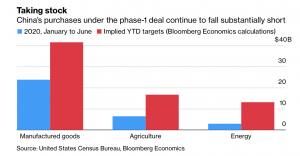U.S., China “Committed” to “Success” of the Phase One Trade Deal
Wall Street Journal writers Bob Davis and Lingling Wei reported this week that, “Senior U.S. and Chinese officials said they were committed to carrying out the phase-one trade accord between the two nations, the two governments said, after the two sides discussed the pact Monday evening U.S. time.
“The videoconference brought together U.S. Trade Representative Robert Lighthizer, Treasury Secretary Steven Mnuchin and Chinese Vice Premier Liu He for a formal review of the trade deal signed in January. The trade representative’s office released a one-paragraph summary of the talks, which it said included discussions of ‘significant increases’ in the purchases of U.S. products by China.
“Talks also reviewed steps Beijing had taken to protect American intellectual property and liberalize China’s market for financial services, according to the statement. ‘Both sides see progress and are committed to taking the steps necessary to ensure the success of the agreement,’ it said.”
The Journal writers pointed out that, “But the USTR statement made no mention of any subjects that China planned to bring up. Those included concerns over the intensifying U.S. actions against Chinese technology firms. In recent days, the Trump administration has threatened bans on the TikTok app owned by Chinese internet company ByteDance Ltd. and Tencent Holdings Ltd. ’s WeChat.
“A statement published by China’s official Xinhua News Agency said the two sides had ‘a constructive dialogue on strengthening bilateral coordination of macroeconomic policies and the implementation of the phase-one trade agreement.’”
The article added that, “The videoconference was initially expected to occur around Aug. 15, but was delayed while the two sides decided on an appropriate time. For markets, the talks could provide a measure of relief.”
Reuters writers Eric Beech and Roxanne Liu reported this week that, “Chinese purchases of U.S. goods are running well behind the pace needed to meet a first year increase of $77 billion specified in the deal, according to official data.
“While China has recently ramped up buying of farm goods including soybeans, it is far from meeting its commitment to buy $36.5 billion worth of U.S. agricultural goods under the deal – purchases that Trump has counted on to bolster his support in farm states that backed him in the 2016 election.
The United States exported just $7.274 billion in agricultural goods to China in the first half of the year, according to the U.S. Census Bureau.
Also this week, Bloomberg News reported that, “China would need to buy about $130 billion in the second half of this year to comply with the original terms of the agreement signed in January, in which it agreed to purchase an additional $200 billion of American goods and services over the 2017 level by the end of 2021.”

New York Times writers Ana Swanson and Keith Bradsher reported on Monday that, “Many trade experts called the purchasing goals unrealistic, even before the pandemic. But the administration’s supporters say the purchases will most likely increase toward the end of the year, when harvest season arrives for key American crops like soybeans. China has already sharply increased its purchases of American corn and soybeans this summer.”
“At least for now, the trade deal has emerged as a surprising source of stability in a relationship that is increasingly troubled on other fronts,” the Times article noted.
And Associated Press Joe McDonald writer pointed out this week that, “The two governments have yet to announce plans for face-to-face talks in the next stage of negotiations.”
Meanwhile, Reuters News reported this week that, “China’s July pork imports more than doubled to 430,000 tonnes from a year earlier and hit a record monthly volume, customs data showed, despite tough new checks on cargoes that had slowed clearing at ports.
“Chinese importers have been bringing in huge volumes of meat this year to fill a large domestic supply shortage after an epidemic of African swine fever killed millions of pigs.”
Bloomberg News reported on Monday that, “China boosted imports of farm goods ranging from corn to pork to sorghum last month, signaling a demand recovery for protein in the world’s most-populous nation.
“Imports of corn, used in animal feed by the world’s second-largest consumer, climbed to a three-year high in July as the country sought more supplies to plug a widening shortage and cool surging prices.”
The Bloomberg article stated that, “Imports of most farm commodities surged last month, according to data published by China’s General Administration of Customs. Corn imports surged 136.5% from a year earlier to 910,000 tons in July, pork purchases jumped 120% to 430,000 tons, while inbound shipments of beef rose 35% to 210,000 tons.”
Source: Keith Good, Farm Policy News

